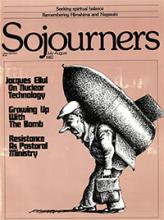Volkmar Deile was a pastor and the director of Action Reconciliation, an organization in the German peace movement particularly active in the churches when this interview appeared. In early spring 1982 he toured the United States with other leaders of the European Peace Movement and stopped in the Sojourners office, where he was interviewed by Jim Wallis and Danny Collum.
--The Editors
Sojourners: Could you share with us your impressions of your trip through the United States?
Volkmar Deile: One of the most interesting things for us is that we have been very, very well received, and the response to us is very encouraging. It has been very surprising for us that when we have spoken in meetings, our audiences have arisen and applauded us.
We have the feeling that there is an awakening in this country about disarmament; people are interested and want to know about it. The main goal of our trip, and I think we have reached it, was to give some of our European hope on this issue.
The freeze campaign is known all over the country, although sometimes people haven't known the difference between the nuclear freeze proposal, which calls for a bilateral freeze now on all nuclear weapons, and the proposal Reagan made that first we must reach equality and then we can freeze. But at most meetings, the people knew that Reagan's proposal is a trick, using the phrases from the peace movement--the words "freeze" and "arms reduction"--but playing the old game, always saying to justify their own military buildup that we must reach equality.
On most of the phone-in talk shows we participated in, the first question was, "What about the Russians?" We met very often the fear that tomorrow the Russians will invade us if we take one step of disarmament. And that is, for us in Europe, very astonishing, because we live nearer to the Russians than the American people do.
Read the Full Article

